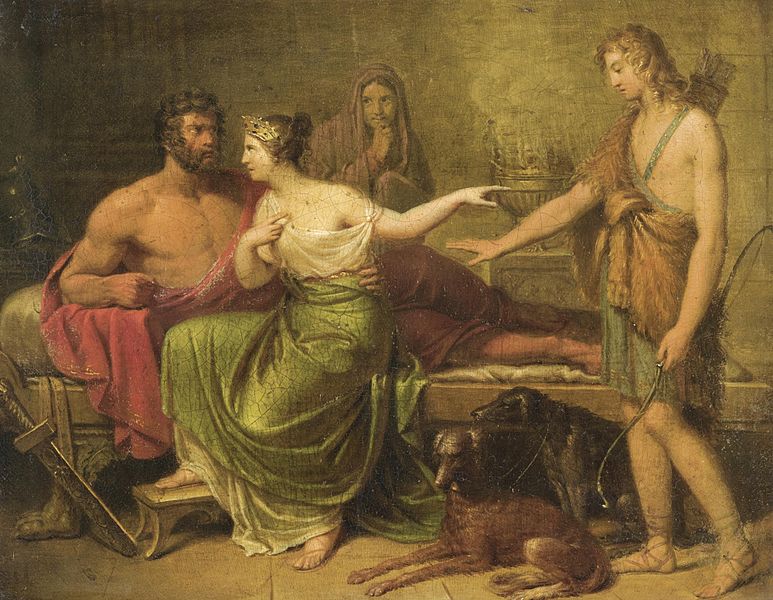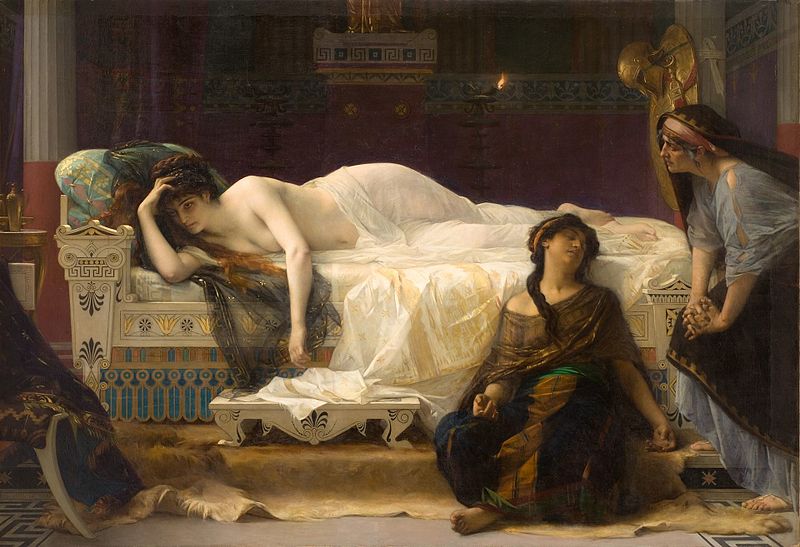PHAEDRA IN GREEK MYTHOLOGY
Phaedra in Greek Mythology
Phaedra was a Cretan princess and an Athenian queen in the tales of Greek mythology. Phaedra is today most famous for being the wife of Theseus, and for her death, although in the ancient sources many different variations of the life of Phaedra are told.
Phaedra of Crete
Phaedra was the daughter of King Minos of Crete and his wife Pasiphae, and thus, Phaedra was sister to Androgeus, Catreus, Deucalion and Ariadne amongst others.
Phaedra and Theseus
|
Famously, it was Phaedra’s sister, Ariadne who had departed Crete with Theseus, after the slaying of the Minotaur, and yet it was Phaedra who ended up as Queen of Athens, but there is disagreement about how Phaedra ended up in Athens.
Some tell of Theseus of abducting Phaedra from Crete, for Theseus was often blamed for abducting women. |
|
Others though affirm that King Deucalion of Crete, Phaedra’s brother, arranged the marriage of Phaedra to Theseus to cement ties between Athens and Crete. Though others say this was impossible, for they say that Theseus had killed Deucalion during his escape from Crete.
Nevertheless, Phaedra and Theseus were married, and this marriage produced two sons, Demophon and Acamas.
Nevertheless, Phaedra and Theseus were married, and this marriage produced two sons, Demophon and Acamas.
Phaedra and Hippolytus
|
Theseus though, had other children, including Hippolytus, the son of Theseus born to the Amazon, Hippolyta (or Antiope). Hippolytus would reside in Troezen, the city of Theseus’ birth, where Theseus’ grandfather, Pittheus, was grooming Hippolytus as the future king of Troezen.
Phaedra though, would fall in love with her stepson. Some say this was simply due a natural attraction, and some say that it was a curse placed on Phaedra by Aphrodite. There is then some disagreement about what Phaedra did when she was in love with Hippolytus. Some say that Phaedra was content just to spy upon Hippolytus, and to keep her love a secret, Phaedra’s secret though would be revealed when Phaedra’s nurse told Hippolytus. Some say that Phaedra then committed suicide to avoid the potential disgrace. Others though tell of how Phaedra tried to seduce Hippolytus, but was rejected, for Hippolytus was a chaste follower of Artemis, who potentially had a hatred of women. The rejected Phaedra then told Theseus, or wrote a letter, claiming that Hippolytus had raped her, or attempted to rape her. Theseus then killed Hippolytus or cursed him, resulting in Poseidon sending a bull that scared the horses pulling Hippolytus’ chariot, resulting in Hippolytus’ death. Phaedra then committed suicide. |
|
Phaedra and the Downfall of Theseus
The death of Phaedra also starts events which would lead to the downfall of Theseus, for after Phaedra’s death Theseus decides that his next bride will be a daughter of Zeus. Theseus thus abducts Helen, daughter of Zeus and Leda, but Helen’s brothers Castor and Pollox, rescue her, and place Menestheus on the throne of Athens; Theseus at this time is prisoner in the Underworld.
When Theseus returns he has no kingdom to rule, and Theseus would end up on Skyros, where he dies. Phaedra and Theseus’ son, Demophon, does eventually become king of Athens though.
When Theseus returns he has no kingdom to rule, and Theseus would end up on Skyros, where he dies. Phaedra and Theseus’ son, Demophon, does eventually become king of Athens though.
|
|
Colin Quartermain - Phaedra - 27th January 2020

